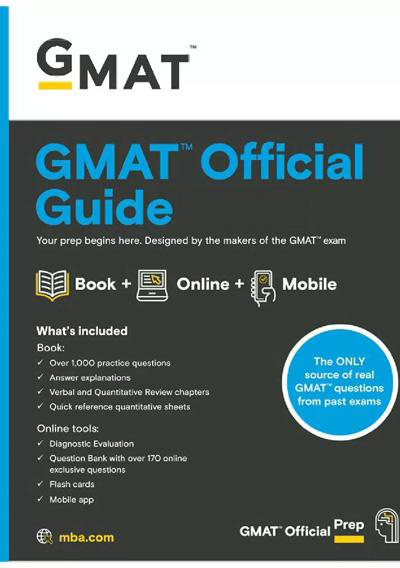Description
GMAT Past Questions – 2024 PDF Download
This GMAT Aptitude Test Past Questions study pack helps you to prepare for the GMAT test. It helps you familiarize yourself with the kind of questions you will face in the test using actual questions from previous exams.
Gmat uses aptitude assessments as part of their multi-stage assessment procedures for the selection and development of staff. Research has shown that they are powerful predictors of performance at work. The test is usually conducted by the in-house recruitment department or outsourced to recruitment companies like solid hire, or workforce groups.
PRACTICE WITH REAL GMAT PAST QUESTIONS
The easiest way to gauge your success as you study for the GMAT is to practice with questions written by the Admissions Council for Graduate Management (GMAC). The Free GMATPrep App and other GMAT tools, such as the GMAT Question Pack, GMAT Exam Packs 1 and 2, GMAT Paper Tests, the Official Guide to GMAT Analysis 2017, the GMAT Integrated Reasoning Prep Tool, and GMAT Write (which will help you with the Essay section) provide official GMAT practice questions.
The GMAT tests fundamental skills in learning mathematics, grammar, and comprehension. In addition to using GMAT-specific practice questions, you will also need to resolve any holes in your basic knowledge that will allow you to be successful at the test.
GMAT PAST QUESTIONS EXAM FORMAT
First of all, you need to know the ins and outs of the GMAT format. For example, you may have excelled in high school and college math classes but still struggle with the GMAT quant portion. The GMAT checks the skills in different ways that you may not be able to work with. It is critical that you become familiar with the GMAT pace, pacing, and visuals.
Securing a job at the World Bank is a significant accomplishment, and the job aptitude test is a crucial step in the selection process. To help you prepare effectively, this blog post provides insights into World Bank job aptitude test past questions and their answers. While specific questions and answers cannot be provided due to copyright restrictions, we will discuss the types of questions you can expect and offer tips on how to approach them.
GMAT Aptitude Test Past questions kit follows the Face of Testing E-recruiter questioning style and pulls questions from these areas:
Verbal Reasoning
Numerical Reasoning’
Logical Reasoning
Abstract Reasoning
Inductive/Deductive Reasoning
GMAT SAMPLE QUESTIONS
1. Biologists with a predilection for theory have tried—and largely failed—to define what it is that makes something a living thing. Organisms take in energy-providing materials and excrete waste products, but so do automobiles. Living things replicate and take part in evolution, but so do some computer programs. We must be open to the possibility that there are living things on other planets. Therefore, we will not be successful in defining what it is that makes something a living thing merely by examining living things on Earth—the only ones we know. Trying to do so is analogous to trying to specify _______.
Which of the following most logically completes the passage?
- the laws of physics by using pure mathematics
- what a fish is by listing its chemical components
- what an animal is by examining a plant
- what a machine is by examining a sketch of it
- what a mammal is by examining a zebra
EXPLANATION
Argument Construction
Situation Some biologists have tried, unsuccessfully, to find a theoretically defensible account of what it means for something to be a living thing. Some of the suggested definitions are too broad because they include things that we would not regard as living. To find life on other planets, we must not narrow our conception of life by basing it simply on the kinds of life encountered on Earth.
Reasoning Which of the answer choices would be the logically most appropriate completion of the argument? The argument points out that life-forms elsewhere in the universe may be very different from any of the life-forms on Earth. Both life-forms on Earth and life-forms discovered elsewhere would all qualify as members of a very large class, the class of all life-forms. Taking lifeforms on Earth, a mere subset of the class of all life-forms, as representative of all life-forms would be a logical mistake and might not lead to success in defining what it means for something to be a living thing. The correct answer choice, therefore, would involve a case of specifying what some general class of things is by examining the members of only a small, and not necessarily representative, subset of that class of things. In other words, the correct answer choice will involve the logical mistake of taking a subset as representative of a larger class.
- Pure mathematics is not a subset of the law of physics, so this does not involve the logical mistake of taking a subset as representative of a larger class.
- The chemical components of a fish are what make up the fish; they are not a small subset of the fish, so this does not involve the logical mistake of taking a subset as representative of a larger class.
- Plants are not a subset of the class of animals, so this does not involve the logical mistake of taking a subset as representative of a larger class.
- A sketch of a machine is not a subclass of the machine itself, so this does not involve the logical mistake of taking a subset as representative of a larger class.
- Correct. This involves the logical mistake of taking the class of zebras, a subclass of the class of mammals, as representative of the class of all mammals. Logically, it resembles taking the class of life-forms on Earth as representative of the class of all life-forms.
The correct answer is E.
2. In the 1960s, surveys of Florida’s alligator population indicated that the population was dwindling rapidly. Hunting alligators was banned. By the early 1990s, the alligator population had recovered, and restricted hunting was allowed. Over the course of the 1990s, reports of alligators appearing on golf courses and lawns increased dramatically. Therefore, in spite of whatever alligator hunting went on, the alligator population must have increased significantly over the decade of the 1990s.
Which of the following, if true, most seriously weakens the argument?
- The human population of Florida increased significantly during the 1990s.
- The hunting restrictions applied to commercial as well as private hunters.
- The number of sightings of alligators in lakes and swamps increased greatly in Florida during the 1990s.
- Throughout the 1990s, selling alligator products was more strictly regulated than hunting was.
- Most of the sightings of alligators on golf courses and lawns in the 1990s occurred at times at which few people were present on those golf courses and lawns.
EXPLANATION
Argument Evaluation
Situation In the 1960s, hunting alligators was banned in Florida to allow the alligator population to recover—as it did by the early 1990s. Then restricted hunting was allowed. But over the decade, reports of alligators appearing on golf courses and lawns increased greatly. The author of the argument concludes from this information that the alligator population must have increased significantly during the 1990s.
Reasoning What new piece of information would seriously weaken the argument? Increased sightings of alligators could occur either because there are more alligators or because more people are seeing the ones that are there. Any
information indicating an increase in the ratio of people to alligators in locations where the two species coexist could offer an alternative to the hypothesis that the alligator population increased.
- Correct. The argument suggests that Florida is an area in which golf courses and lawns are common. A large rapid increase in the human population of such an area would probably lead to a significant increase in the number of golf courses and lawns, some of which would encroach on the alligators’ habitats. Even without any increase in the overall number of alligators, this could lead to an increase in both the percentage of alligators that venture onto golf courses and lawns and the number of people who happen to be in such locations when alligators are present.
- This information is peripheral to the issue we are being asked to address; it neither weakens nor strengthens the argument.
- This information tends to strengthen, not weaken, the argument; it suggests that the frequency of reported sightings in other places was reliable and that the sightings indicated a surge in the alligator population.
- To the extent that this is relevant, it could provide some weak support for the argument. Strictly regulating the sale of alligator products could deter alligator hunting by making it less profitable and could thus allow further increases in the alligator population.
- Without further evidence, the net effect of this information cannot be reliably determined. On the one hand, if sightings is understood as elliptical for reports of seeing alligators, this could suggest that some of the reports may be dubious because they are not corroborated by additional observers. On the other hand, it suggests that the alligator population may in fact have increased. Times when few people are present are also times when wildlife such as alligators would be more likely to venture onto lawns and golf courses. Without any evidence that sightings before the 1990s did not typically occur in such conditions, this suggests that the number of alligators observable at those times increased in the 1990s.
The correct answer is A.
3. Infotek, a computer manufacturer in Katrovia, has just introduced a new personal computer model that sells for significantly less than any other model. Market research shows, however, that very few Katrovian households without personal computers would buy a computer, regardless of its price. Therefore, introducing the new model is unlikely to increase the number of computers in Katrovian homes.
Which of the following is an assumption on which the argument depends?
- Infotek achieved the lower price of the new model by using components of lower quality than those used by other manufacturers.
- The main reason cited by consumers in Katrovia for replacing a personal computer is the desire to have an improved model.
- Katrovians in households that already have computers are unlikely to purchase the new Infotek model as an additional computer for home use.
- The price of other personal computers in Katrovia is unlikely to drop below the price of Infotek’s new model in the near future.
- Most personal computers purchased in Katrovia are intended for home use.
EXPLANATION
Argument Construction
Situation In Katrovia, a new personal computer model costs less than any other model. But market research shows that very few Katrovian households without personal computers would buy even cheap ones.
Reasoning What must be true in order for the stated facts to support the conclusion that introducing the new computer model is unlikely to increase the overall number of computers in Katrovian homes? The market research supports the conclusion that no new computer model is likely to significantly increase the number of computers in Katrovian homes that currently lack computers. But the overall number of computers in Katrovian homes will still increase if Katrovian homes that already have computers buy additional computers while keeping their existing ones. So the argument has to assume that the new computer model will not increase the number of additional computers purchased for Katrovian homes that already have computers.
- Even if Infotek used high-quality components in the new computer model, Katrovians might still refuse to buy it.
- Replacing a personal computer does not change the overall number of personal computers in homes, so Katrovians’ motives for replacing their computers are irrelevant to the argument.
- Correct. As explained above, unless computers of the new model are purchased as additional computers for Katrovian homes that already have computers, the new model’s introduction is unlikely to increase the overall number of computers in Katrovian homes.
- The assumption that other personal computer prices would stay relatively high does not help establish the link between its premises and its conclusion. If answer choice D were false, the argument would be no weaker than it is without any consideration of other computers’ potential prices.
- If most personal computers purchased in Katrovia were not intended for home use, then the new model’s introduction would be even less likely to increase the number of personal computers in Katrovian homes. So the argument does not depend on assuming that most of the computers purchased are for home use.
The correct answer is C.
4. Fast-food restaurants make up 45 percent of all restaurants in Canatria. Customers at these restaurants tend to be young; in fact, studies have shown that the older people get, the less likely they are to eat in fast-food restaurants. Since the average age of the Canatrian population is gradually rising and will continue to do so, the number of fast-food restaurants is likely to decrease.
Which of the following, if true, most seriously weakens the argument?
- Fast-food restaurants in Canatria are getting bigger, so each one can serve more customers.
- Some older people eat at fast-food restaurants more frequently than the average young person.
- Many people who rarely eat in fast-food restaurants nevertheless eat regularly in restaurants.
- The overall population of Canatria is growing steadily.
- As the population of Canatria gets older, more people are eating at home.
EXPLANATION
Argument Evaluation
Situation In Canatria, the older people get, the less likely they are to eat in fast-food restaurants. The average age of Canatrians is increasing.
Reasoning What evidence would most weaken the support provided by the cited facts for the prediction that the number of fast-food restaurants in Canatria is likely to decrease? The argument implicitly reasons that since studies have shown that Canatrians tend to eat in fast-food restaurants less as they get older, and since Canatrians are getting older on average, the proportion of Canatrians eating in fast-food restaurants will decline. The argument assumes that this means the overall number of fast-food restaurant customers will decline and that demand will decrease enough to reduce the number of fast-food restaurants that can sustain profitability. Consequently, fewer new fast-food restaurants will open or more old ones will close, or both. Thus, the number of fast-food restaurants in Canatria will fall. Any evidence casting doubt on any inference in this chain of implicit reasoning will weaken the argument.
- This strengthens the argument by providing additional evidence that the total number of fast-food restaurants will decrease. If the average number of customers per fastfood restaurant is increasing, then fewer fast-food restaurants will be needed to serve the same—or a lesser—number of customers.
- Even if a few individuals do not follow the general trends described, those trends could still reduce the overall demand for and number of fast-food restaurants.
- The argument is only about fast-food restaurants, not restaurants of other types.
- Correct. This suggests that even if the proportion of Canatrians eating at fast-food restaurants declines, the total number doing so may not decline. Thus, the total demand for and profitability of fast-food restaurants may not decline either, so the total number of fast-food restaurants in Canatria may not decrease.
- If anything, this strengthens the argument by pointing out an additional trend likely to reduce the demand for, and thus the number of, fast-food restaurants in Canatria
The correct answer is D.
5. Transportation expenses accounted for a large portion of the total dollar amount spent on trips for pleasure by residents of the United States in 1997, and about half of the total dollar amount spent on transportation was for airfare. However, the large majority of United States residents who took trips for pleasure in 1997 did not travel by airplane but used other means of transportation.
If the statements above are true, which of the following must also be true about United States residents who took trips for pleasure in 1997?
- Most of those who traveled by airplane did so because the airfare to their destination was lower than the cost of other available means of transportation.
- Most of those who traveled by airplane did so because other means of transportation to their destination were unavailable.
- Per mile traveled, those who traveled by airplane tended to spend more on transportation to their destination than did those who used other means of transportation.
- Overall, people who did not travel by airplane had lower average transportation expenses than people who did.
- Those who traveled by airplane spent about as much, on average, on other means of transportation as they did on airfare.
EXPLANATION
Argument Construction
Situation In 1997, about half of total transportation spending by U.S. residents taking trips for pleasure was for airfare. But the large majority of U.S. residents who took trips for pleasure in 1997 did not travel by airplane.
Reasoning What can be deduced from the stated facts? The information provided indicates that among U.S. residents who took trips for pleasure in 1997, those who traveled by airplane were a small minority. Yet this small minority’s spending for airfare accounted for half of all transportation spending among residents taking trips for pleasure. It follows that on average, those who traveled by airplane must have spent far more per person on transportation than those who did not travel by airplane.
- This does not follow logically from the information given. Most of those who traveled by airplane may have done so even if flying was more expensive than other modes of transportation—for example, because flying was faster or more comfortable.
- This does not follow from the information given. Most of those who traveled by airplane may have done so even if many other modes of transportation were available —the other modes may all have been less desirable.
- This does not follow from the information given. Those who traveled by airplane may have traveled much farther on average than those who used other means of transportation, so their transportation spending per mile traveled need not have been greater.
- Correct. As explained above, those who traveled by airplane must have spent more per person on transportation than those who did not travel by airplane, on average. In other words, those who did not travel by airplane must have had lower average transportation expenses than those who did.
- This does not follow from the information given. Although half the total dollar spending on transportation was for airfare, much of the transportation spending that
was not for airfare was by the large majority of U.S. residents who did not travel by airplane.
The correct answer is D.
6. Voters commonly condemn politicians for being insincere, but politicians often must disguise their true feelings when they make public statements. If they expressed their honest views— about, say, their party’s policies—then achieving politically necessary compromises would be much more difficult. Clearly, the very insincerity that people decry shows that our government is functioning well.
Which of the following, if true, most seriously undermines this reasoning?
- Achieving political compromises is not all that is necessary for the proper functioning of a government.
- Some political compromises are not in the best long-term interest of the government.
- Voters often judge politicians by criteria other than the sincerity with which they express their views.
- A political party’s policies could turn out to be detrimental to the functioning of a government.
- Some of the public statements made by politicians about their party’s policies could in fact be sincere.
EXPLANATION
Argument Evaluation
Situation Politicians must often make insincere public statements because expressing their true feelings would make it harder for them to achieve politically necessary compromises.
Reasoning What would suggest that the argument’s premises do not establish that politicians’ insincerity shows our government is functioning well? The implicit reasoning is that insincerity helps politicians achieve politically necessary compromises, and these compromises help our government to function well, so insincerity must show that our government is functioning well. Evidence that these necessary compromises do not ensure that our government functions well would undermine the argument’s reasoning, as would evidence that politicians’ insincerity has other substantial effects that hinder the government’s functioning.
- Correct. If governments may function poorly even when insincerity allows necessary political compromises to be made, then the argument’s premises do not establish that politicians’ insincerity shows our government is functioning well.
- The argument does not require that all political compromises help government to function well, only that politically necessary compromises do.
- Even if voters often judge politicians by criteria other than their sincerity, they may also often decry politicians’ insincerity, not realizing or caring that such insincerity helps the government function well.
- Even if a political party’s policies impair the government’s functioning, politically necessary compromises by politicians in that party could improve the government’s functioning.
- Even if politicians sometimes speak sincerely about their party’s policies, their general willingness to be insincere as needed to achieve politically necessary compromises could be a sign that the government is functioning well.
The correct answer is A.
The timing is subject to change every year.
This study pack helps you find out more about your strengths and areas you need to improve on.






OSENI SHERIF ABIODUN –
The best text and exam solutions ever.
Venon chipusa –
For revision
Venon chipusa –
For corsintation
SOBO PEREWOLADE Esther –
Good site